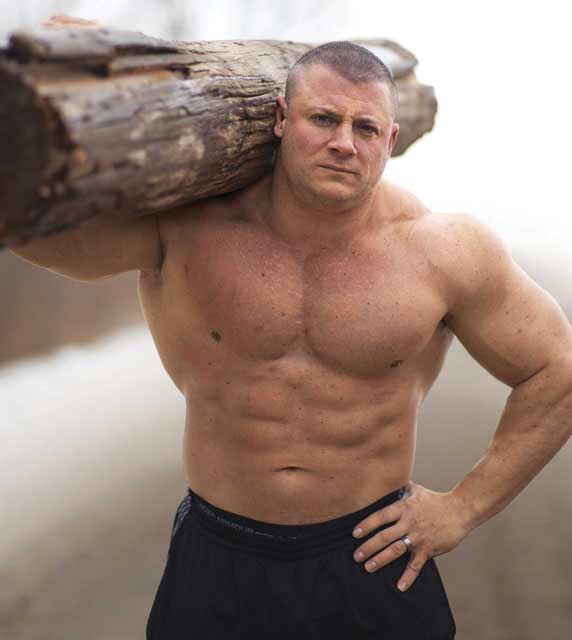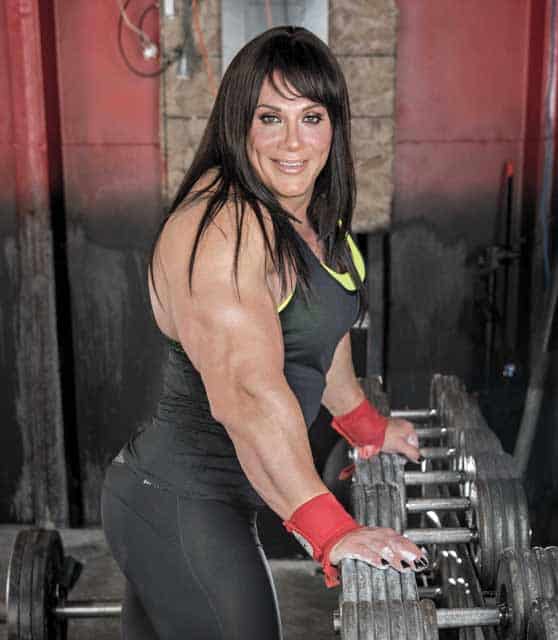Janae today
by Rebecca M. Alvin
No one really has the body they wish they had. It’s almost human nature to have a disconnect between who we know ourselves to be and who we appear to be to the outside world. But when that dysphoria extends to our very identity as male, female, or another gender entirely, the space between our internal and external selves is the site of intolerable pain and anxiety.
Janae Kroczaleski, formerly known as bodybuilder and powerlifting champion Matt “Kroc” Kroczaleski, has never accepted the idea of biology as destiny. In the new documentary Transformer, which has been making its way through the festival circuit and will open in theaters and on streaming services nationwide this month, she reflects on her former life living as a man in the world of perhaps the most exaggerated form of masculinity, professional powerlifting, and sees someone building his body up both to hide her non-binary identity and also to create a shell of muscle to protect and defend against the intolerance of the world.

“Pursuing strength and muscularity and feminizing my body, a lot of people would perceive that as two opposites, but I really don’t feel that they are,” says Kroczaleski by phone from her home in Michigan. “It took me a long time to sort that out because, you know, society conditions us to believe that. But both those pursuits are just attempts for me to feel comfortable in my own skin.”
When she came out as Janae, first to friends and family and then publicly when a blogger outed her, the physical aspects of her transition were particularly complex, as she did not want to give up the incredible shape into which she had sculpted her body since childhood. And yet in order to successfully pass as female, her muscular body was going to need to change. The film documents her hormonal and surgical procedures to effect that change, but there is always a hesitancy on her part when it comes to letting go of what others see as her most masculine features.
“Honestly, there was a lot of confusion for me. That’s why I struggled back and forth over a decade, you know, trying to lose weight, trying to gain it back, losing strength and gaining it back. And it confused me,” Kroczaleski admits. “I’m like, ‘Gosh, if I know my gender identity is female, why am I struggling so much with getting smaller and weaker, and why doesn’t it make me feel better?’ It wasn’t until I started becoming close to a lot of [cisgender] women in the strength training community that everything made sense, because they had the exact same struggles. They were passionate about being bigger and stronger and more muscular, but they had all these ideas from their families, from their friends, you know, ‘Why are you doing that? Why do you want to do that? You look like a man.’ But it’s something that’s very empowering to them and something they’re passionate about. So hearing them, was like ‘Oh my God, this all makes sense now.’ And they really helped me to find balance with everything.”

These somewhat arbitrary lines that have been drawn between what is male and what is female have always been problematic. But in recent times, with so much more acceptance of gender as a spectrum, individuals are beginning to examine their own genders and see what discrepancies there are between the societal labels and what gender means to them, personally. For Kroczaleski, her gender does not easily fit those binary labels. “If you’re going to only give me two choices, you know male and female, then I definitely identify as female, but in reality it’s more complicated than that. I have some very masculine aspects to my personality. I have some very feminine aspects to my personality… There is a degree of fluidity to my gender. And also I identify as nonbinary because I just don’t fit in this clearly male or female world. If the world’s black and white, I’m kind of gray, you know, I’m all kind of muddied up and mixed in there,” she explains.
Kroczaleski was not only at the top of her field as an athlete. She also served in the U.S. Marines, even being assigned to presidential security in the Bill Clinton administration prior to coming out. Although she admits she hasn’t been too active, publicly, on the issue of transgender people serving in the military, she says she tries to talk to people about these issues one on one and sometimes at speaking engagements. But in the athletic arena, she is much more involved and vocal about the participation of transgender athletes in competition with their cisgender counterparts.
Is it fair for trans women to compete with cisgender women in sports? Looking at it purely from the perspective of the data that’s been gathered, Kroczaleski explains, trans women who follow the guidelines for their sport (she uses the example of the Olympics and their requirements as far as hormone therapy and surgery requirements) are physiologically on equal footing with cisgender female athletes.
“Trans women have been able to compete in the Olympics since 2004, and since that time, there has not been one trans woman that has broken a world record. There has not been one trans woman that has won a Gold medal at the Olympics. There has not been one trans woman that has even medaled. And there has not been one trans woman that has even qualified for an Olympic team,” she says, arguing that this supports the data she’s seen that demonstrates no significant phsyical advantages.
But that doesn’t mean there isn’t a lot of work to do in the world of women’s sports. “Historically, someone who’s been socialized as a male and competed with males, probably the biggest advantage they have is having competed at a higher level of competition, and having greater expectations,” Kroczaleski explains. The fix for this is more women in sports and higher expectations for what women are able to achieve.
“Athletes, especially, will rise to the level they’re expected to compete at,” says Kroczaleski. “With women, because the expectations are often so much lower, they’re not shooting for as high as they should be. And I think we’re seeing that now. There’s more and more women getting into athletics, and the level of competition is getting higher. Especially like in women’s powerlifting. The sport has exploded in the last five years, and we’re seeing the records climb up at a very fast rate. And in part that’s because women see other women doing stuff, and then they start expecting that from themselves. They start believing they’re capable of more.”
Transformer opens in theaters and on streaming services on Friday, October 19. For more information on the film and where to see it visit transformerfilm.com.











